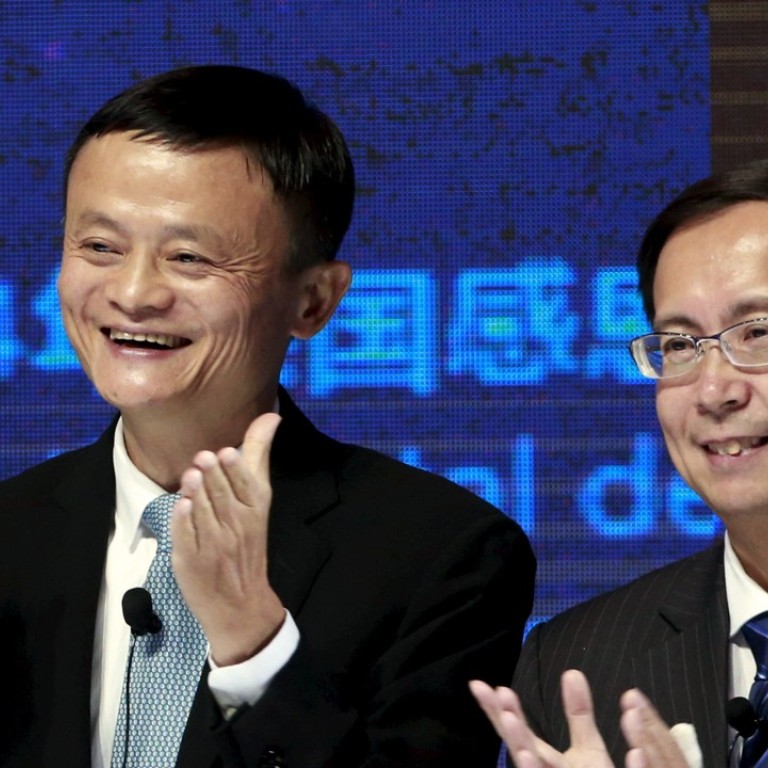
Alibaba appoints Daniel Zhang to succeed Jack Ma as chairman in 12-month succession plan
Ma, the co-founder of Asia’s most valuable company and one of China’s most recognisable names, will remain Alibaba’s executive chairman for 12 months until September 10, 2019
Jack Ma will hand over the keys of Asia’s most valuable company to Alibaba Group Holding’s chief executive officer, in an unprecedented succession plan that will slowly take the focus off one of China’s most recognisable corporate names over the next 12 months.
Under the plan, Daniel Zhang will be promoted to executive chairman on September 10, 2019, while Ma remains a director on Alibaba’s board and a permanent member of the Alibaba Partnership, according to a letter to all staff including the South China Morning Post, wholly owned by the Hangzhou-based company.
Ma said he would remain Alibaba’s executive chairman during the year-long period to ensure a “smooth and successful” transition, and stay on as an Alibaba director until a shareholders’ meeting in 2020.
“This is merely the beginning of a succession strategy of creating a step ladder to groom the next generation of managers,” said Joseph P.H. Fan, co-director of the Institute of Economics and Finance at the Chinese University of Hong Kong. “Jack Ma’s halo is too bright, and outshines whoever’s under him, so he needs to fade out. But for a company of Alibaba’s size, it’s a process that will take 10 years to complete.”
Who is the ‘free and unfettered spirit’ stepping into Jack Ma’s shoes?
The succession plan, which took a decade to put together, was announced on Ma’s 54th birthday, coinciding with Teachers Day in Hong Kong and mainland China. The day holds special meaning for Ma, who taught English in Hangzhou before venturing into business in 1999.

“Teachers always want their students to exceed them, so the responsible thing to do - for me and the company - is to let younger, more talented people take over in leadership roles so that they inherit our mission of making it easy to do business anywhere,” Ma said in his letter to staff.
Asian families confront awkward trust issues in succession planing
Alibaba’s plan stands in contrast to many of Asia’s wealthiest family-owned business dynasties, often handed from father to (usually) sons even when they become publicly traded companies. Up to 85 per cent of Asia’s billionaires face a shift from first-generation founders to their successors, according to a 20-year study by UBS of 1,400 billionaires in 2016.
“Ma is a pioneer among the Chinese entrepreneurs who are now exploring for the best model to hand over their successes to the next generation,” said Fan, who co-authored The Family Business Map: Assets and Roadblocks in Long Term Planning.
Li Ka-shing, Hong Kong’s wealthiest man, announced his retirement almost a year in advance to minimise disruptions to his two flagship companies CK Asset and CK Hutchison.
Jack Ma to unveil Alibaba’s succession plan, paving the way for younger talent to take over
Unlike Li, “Alibaba’s leader cannot just hand over his stake from father to son, so the company must create a system for handing over. It’s an unprecedented model. Time can only tell if it works,” Fan said.
With Ma as the public face of Alibaba, the company has exploded in size over the last two decades to become the first to surpass US$500 billion in value.
The company, founded in 1999 by Ma and 17 co-founders with US$60,000, has declared a plan to thrive for at least 102 years, a target that leaves its corporate legacy across three centuries.
“Everyone at Alibaba thinks long term, but knowing Jack, he thinks 20 years beyond everybody else,” said Joe Tsai, Alibaba’s executive vice-chairman who joined the company in 1999 as a co-founder.
Ma is the youngest among Asia’s three wealthiest men. Still, he began thinking about his succession plan a decade ago. He stepped down as Alibaba’s chief executive officer in 2013, promoting Zhang to the job two years later.
“This transition demonstrates that Alibaba has stepped into the next level of corporate governance from a company that relies on individuals, to one built on systems of organisational excellence and a culture of consistent talent development,” Ma said. “Alibaba was never about Jack Ma, but Jack Ma will forever belong to Alibaba.”
Life after Alibaba is unlikely to be filled with wandering hours or idle days, Ma said. Education, the environment, philanthropy through his Jack Ma Foundation, and work with the Alibaba Partnership are the likely pursuits that will keep him busy, he said.
“I still have lots of dreams to pursue. Those who know me know that I do not like to sit idle,” Ma said. “And, the world is big, and I am still young, so I want to try new things. What if new dreams can be realised?”


